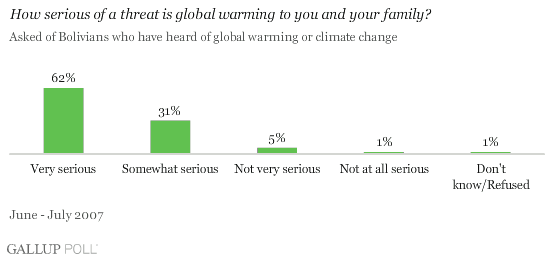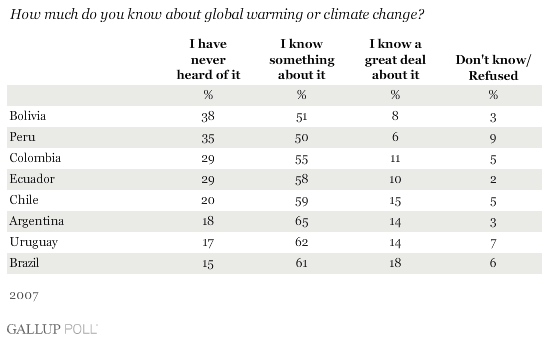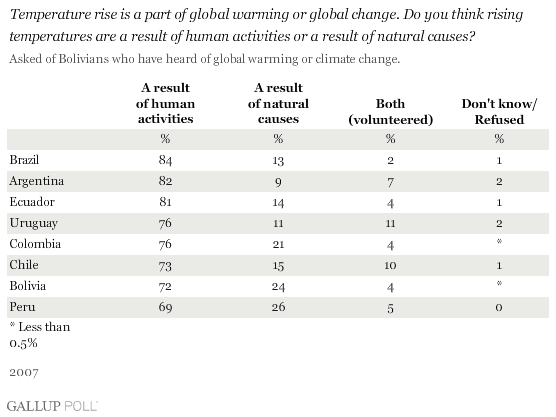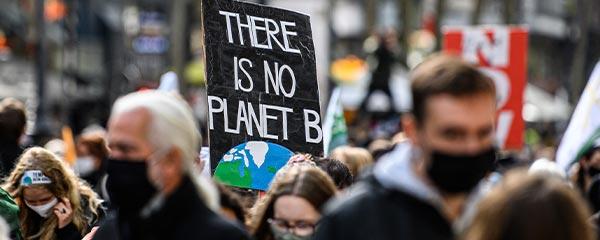WASHINGTON, D.C. -- For the second consecutive year, floods are wreaking havoc on many parts of Bolivia. In response, the country's leaders are again publicly blaming the floods on climate change and demanding that the international community take action. Â鶹´«Ã½AV finds that nearly all Bolivians who have heard of global warming or climate change consider it a "somewhat serious" or "very serious" threat.

Since last year, high-ranking Bolivian officials, including President Evo Morales and most recently Foreign Minister David Choquehuanca, have blamed the flooding in their country on global climate change and on those countries that they perceive are most responsible for the problem. Bolivian leaders are demanding that the international community pay for the damage and help with recovery efforts. However, many Bolivians' perception that global warming is a serious threat is not necessarily directly linked to the flooding, as Â鶹´«Ã½AV polling last year fell between the two flood-ridden, rainy seasons, and not at the height of the natural disasters.
Residents in eight South American countries Â鶹´«Ã½AV surveyed in 2007 appear to have a similar sentiment as Bolivians do about the threat of global warming. More than 90% of respondents in Argentina, Brazil, Chile, Colombia, Ecuador, Peru, and Uruguay who have heard of global warming also believe that it is a somewhat serious or very serious threat to themselves and their families.
Knowledge about Global Warming
When Â鶹´«Ã½AV asked respondents from these South American countries how much they knew about global warming or climate change, Bolivians and Peruvians were the most likely to say they have never heard of it, at 38% and 35% respectively. However, about half of those surveyed in these two countries say they know something about it, and less than 10% in each country say they know a great deal about climate change. A regional median of 25% of respondents in the eight South American countries surveyed say they have never heard of global warming or climate change. Whereas a median of 59% of those surveyed say they know something about it, a 12% median say they know a great deal, and a median of 5% say they don't know or refused to answer.

Among those respondents who have heard of global warming or climate change, clear majorities in these South American countries believe climate change to be a result of human activities.

In Bolivia, 53% of respondents say they are satisfied with efforts in their country to preserve the environment, while 43% are dissatisfied with these efforts. The regional median for the South American countries surveyed is 41% who say they are satisfied with efforts in their country to preserve the environment, while a regional median of 57% of those surveyed are dissatisfied with these efforts.
When Bolivians were asked about their personal actions to help the environment, about two-thirds (65%) of those surveyed say they tried to use less water in their household, and a majority (52%) say they avoided using certain products that harm the environment. About one-third (32%) of Bolivians say they voluntarily recycled newspapers, glass, aluminum, motor oil, and other items, which is among the highest percentages in the South American countries surveyed. The regional median is 23%. Only 15% of Bolivians say they are active in a group or organization that works to protect the environment.
Survey Methods
Results are based on face-to-face interviews with approximately 1,000 adults, aged 15 and older, in Argentina, Bolivia, Brazil, Chile, Colombia, Ecuador, Peru, and Uruguay, conducted throughout 2007. For results based on the total sample of national adults, one can say with 95% confidence that the maximum margin of sampling error is ±3 percentage points. In addition to sampling error, question wording and practical difficulties in conducting surveys can introduce error or bias into the findings of public opinion polls.